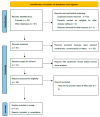Vitamin D3 and COVID-19 Outcomes: An Umbrella Review of Systematic Reviews and Meta-Analyses
- PMID: 36829806
- PMCID: PMC9952713
- DOI: 10.3390/antiox12020247
Vitamin D3 and COVID-19 Outcomes: An Umbrella Review of Systematic Reviews and Meta-Analyses
Abstract
Background: The immune system (innate and adaptive) is influenced by vitamin D3, which affects gene expression and inflammatory pathways. An umbrella review was conducted to evaluate the power and accuracy of data connecting vitamin D3 to the outcomes of COVID-19 infection and to appraise the proof provided by published meta-analyses.
Methods: MEDLINE, Embase, and the Cochrane Library were searched from database inception to 31 May 2022. Meta-analyses of prospective or retrospective observational studies and randomized trials were included. Evidence of association was graded according to the established criteria: strong, highly suggestive, suggestive, weak, or not significant.
Results: From 74 publications, 27 meta-analyses described five associations between vitamin D3 levels and supplementation and COVID-19 outcomes. Low levels of vitamin D3 were significantly associated with severity (highly suggestive evidence; OR = 1.97 [95% CI, 1.55-2.51], p < 0.01; I2 = 77%, p < 0.01) and mortality risk due to COVID-19 disease (OR = 1.83 [95% CI, 1.55-2.16], p < 0.01; I2 = 50%, p < 0.01). Vitamin D3 supplementation, after a diagnosis of COVID-19 infection, was associated with significantly reduced infection severity (e.g., ICU admission) and mortality.
Conclusions: This umbrella review of the available evidence suggests that insufficient vitamin D3 may increase COVID-19 infection risk, severity, and mortality, in addition to showing a highly suggestive association between vitamin D3 supplementation and reduced severity and mortality among infected patients.
Keywords: COVID-19; infection; meta-analysis; umbrella review; vitamin D3.
Conflict of interest statement
The authors declare no conflict of interest.
Figures






References
-
- Martineau A.R., Jolliffe D.A., Greenberg L., Aloia J.F., Bergman P., Dubnov-Raz G., Esposito S., Ganmaa D., Ginde A.A., Goodall E.C., et al. Vitamin D supplementation to prevent acute respiratory infections: Individual participant data meta-analysis. Health Technol. Assess. 2019;23:1–44. doi: 10.3310/hta23020. - DOI - PMC - PubMed
-
- Stroup D.F., Berlin J.A., Morton S.C., Olkin I., Williamson G.D., Rennie D., Moher D., Becker B.J., Sipe T.A., Thacker S.B. Meta-analysis of observational studies in epidemiology: A proposal for reporting. Meta-analysis Of Observational Studies in Epidemiology (MOOSE) group. JAMA. 2000;283:2008–2012. doi: 10.1001/jama.283.15.2008. - DOI - PubMed
-
- Shea B.J., Reeves B.C., Wells G., Thuku M., Hamel C., Moran J., Moher D., Tugwell P., Welch V., Kristjansson E., et al. AMSTAR 2: A critical appraisal tool for systematic reviews that include randomised or non-randomised studies of healthcare interventions, or both. BMJ. 2017;358:j4008. doi: 10.1136/bmj.j4008. - DOI - PMC - PubMed
Publication types
LinkOut - more resources
Full Text Sources

